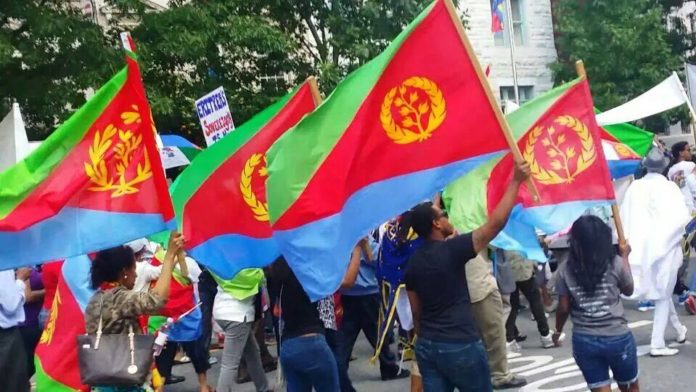The United States is methodically setting the stage for a so-called “humanitarian” military intervention against the small northeast African nation of Eritrea, under legal pretexts much like those used to justify NATO’s war of regime change against Libya, in 2011. As in Libya, the U.S. has hijacked the United Nations human rights apparatus to claim a “responsibility to protect” (R2P) Eritrea’s citizens from alleged abuses by their own government. War and regime change are the intended result.
Washington engineered UN sanctions against Eritrea, beginning in 2009, on the patently bogus charge that Eritrea’s determinedly secular government provided “political, financial and logistical support” to Islamist Shabaab fighters in Somalia. Islamic jihadism is anathema to Eritrea, whose population of six million on the shores of the Red Sea is about evenly divided between Muslims and Christians. But few people in the United States knew Eritrea existed, much less its secular revolutionary history and politics. The lies stuck, as did the sanctions, even after the UN Human Rights Council conceded there was no further evidence of Eritrean aid to the Shabaab.
A three-person UN panel now alleges that Eritrea is a lawless state that has committed “crimes against humanity,” enslaving up to 400,000 people and engaging in murder, forced disappearances, rape and torture. Mark Smith, the Australian chairman of the UN Commission of Inquiry on Human Rights in Eritrea, demands that Eritrea be put on trial before the International Criminal Court, a body that has indicted only Africans – and only those that were on the wrong side of U.S. foreign policy – since its creation in 2002. Smith laid the legal groundwork for the overthrow of the Eritrean government:
There is no genuine prospect of the Eritrean judicial system holding perpetrators to account in a fair and transparent manner. The perpetrators of these crimes must face justice and the victims’ voices must be heard. The international community should now take steps, including using the International Criminal Court [ICC], national courts and other available mechanisms, to ensure there is accountability for the atrocities being committed in Eritrea.
The UN commission demands that Eritrea be put on trial before the International Criminal Court, a body that has indicted only Africans.
In February of 2011, the United Nations Security Council, led by the U.S., Britain and France, referred the case against Libya to the ICC, to provide a criminal justice rationale for the military assault that was already underway against Muammar Gaddafi’s government. This time, Washington has instructed its UN proxies to give “humanitarian” legal cover in advance for an attack on Eritrea. The demonization campaign is built around two Big Lies: one, that Eritrea’s system of national service – a form of draft, which is the right of all nations – amounts to “slavery”; and two, that domestic oppression in Eritrea is a prime source of African refugees to Europe, with the tiny nation allegedly accounting for more cross-continental emigration than every other country except war-ravaged Syria.
National service in Eritrea, as in many other countries, includes not only military duty on the front lines with Ethiopia – which still occupies parts of Eritrea in clear violation of an international arbitration agreement – but also labor in public works projects as well as service in health and education infrastructures. (Most teachers in Eritrea, for example, are national service workers.) Lots of folks would call that socialism or nation-building – which is how the Eritreans see it.
The Eritreans defend extended national service on grounds of necessity, citing an existential threat from the Ethiopian military, backed to the hilt by Washington. Economic sanctions have also necessitated that Eritrea mobilize the population to develop its own national resources. However, self-reliance is also a cornerstone of Eritrean domestic development policy, and seen as central to maintaining true national sovereignty and independence. Eritrea rejects foreign “aid” and entanglements with structures of international capital, and is one of only two nations in Africa that has no relationship with AFRICOM, the U.S. military command on the continent (Zimbabwe is the other).
It is insane to believe that little Eritrea, with only six million people, has set more people to flight than neighboring Ethiopia, one of the poorest countries in the world, with a population 15 times greater.
Eritrea’s fierce independence has put it in imperialism’s crosshairs. Eritrea is “Africa’s Cuba” – and the United States treats it as such in a striking variety of ways. Indeed, the other Big Lie against Eritrea – that it is the second largest contributor to the waves of refugees risking life and limb to reach Europe – is directly related to European immigration policies, urged on them by the U.S., that put Eritrea in much the same bind as U.S. policy towards Cuba.
It is insane to believe that little Eritrea, with only six million people, has set more people to flight than neighboring Ethiopia, one of the poorest countries in the world, now in the throes of a devastating drought, with a population 15 times greater; or neighboring Sudan, also desperately poor and afflicted by multiple wars, with 40 million people; or nearby Somalia, a nation without a state, inhabited by 10 million people. Indeed, economic, political and war refugees from all across Africa claim to be Eritrean because, unlike citizens of any other African country, Eritrean refugees are afforded special status on arrival in Europe as presumptive political refugees who might face torture if returned home. As with U.S. Cuba policy, the Eritrean exception was designed to weaken and destabilize the country through a brain and human resource drain. Inevitably, however, the policy has made Eritrean identification papers the hottest selling documents on the streets of Khartoum and other refugee gathering points. Europe is awash, as is Israel, with fake Eritreans fleeing various military, political and economic catastrophes – most of them rooted in Euro-American foreign destabilization policies and the global capitalist Race to the Bottom.
If Latin Americans could pass for Cubans, the populations of U.S. “Little Havanas” would number in the tens of millions, full of Hondurans, Guatemalans, Salvadorans and Mexicans.
“Economic, political and war refugees from all across Africa claim to be Eritrean.”
Ethiopians pass most easily as Eritreans, since millions of them share the same ethnic background. About half of Eritreans are Tigrayan, the ethnic group that is the fourth largest in Ethiopia and dominates the ruling party in Addis Ababa. The Austrian Ambassador to Ethiopia, Andreas Melan, last year estimated that “among the thousands of Eritrean migrants in Europe, 30 to 40 percent are Ethiopians.” That may be an underestimate. And many more “Eritreans” actually hail from as far away as West Africa.
The Eritrean ambassador to Israel believes that Ethiopians account for half of the purported Eritreans seeking refugee status in that country. “They know the Eritreans automatically receive a six-month visa, so they pretend to be Eritrean,” said the ambassador.
The Eritrean refugee scam is an open secret all across Europe, and is well known to the American and European governments. The Big Lie is maintained to serve imperial purposes, and will now be deployed to justify an armed assault on Eritrea as an alleged mass enslaver and rogue nation. The UN Commission of Inquiry on Human Rights in Eritrea will submit its manufactured findings to the Human Rights Council on June 21, setting the imperial lynch mob in motion.
“They know the Eritreans automatically receive a six-month visa, so they pretend to be Eritrean.”
Eritrea cannot expect a fair hearing from a UN apparatus that is puppeteered from Washington. As the Eritrean government stated in its preliminary response to the UN commission’s charges:
The purposes of national service in Eritrea are clearly stated in a legal proclamation of 1994 and are three-fold: national defense, economic and social development and national integration. The service is not indefinite although for a time and in certain cases it has been prolonged due the already explained existential threat of war.
The commission based its findings on the testimony of about 800 (alleged) Eritreans interviewed in various foreign cities, while ignoring the 42,000 Eritrean expatriates that have petitioned the world body to lift sanctions against their home country.
The UN panel is ignoring what is “effectively a continuing state of war with Ethiopia, the illegal occupation of Eritrean territory which constitutes a flagrant violation of human rights, repeated armed aggression, sanctions and mistaken policies that consider almost all Eritreans asylum-seekers,” said Eritrean government spokesperson Yemane Gebreab. That’s a diplomatic way of putting it. By referring the case to the International Criminal Court, and implicitly threatening military action against Eritrea, the commission has become a warmonger.
On Monday, the New York Times reported that thousands of Ethiopian and Eritrean troops were rushing towards the disputed border, the site of heavy artillery duels. The Times quoted an Eritrean dissident living in Sweden as their expert of the moment. “If there is a war, or the rumor of a war, it could be a way for the Eritrean government to get support and divert attention,” said the dissident. The newspaper also relayed a Twitter message from an Eritrean American in his homeland’s capital. “Here in Asmara, it’s peaceful despite #EthiopianAttacks against #Eritrea on the Tsorona front. And you wonder why there’s national service?”
President Obama seems intent on adding War #8 to his imperial legacy.










